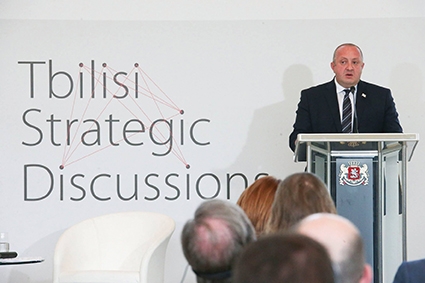President, Opposition against Abolishing National Security Council
President of Georgia Giorgi Margvelashvili and the opposition parties have criticized the ruling party Georgian Dream (GD) for their decision to abolish the National Security Council (NSC), an institution under the Presidential Administration, in order to establish a new organ – the National Defense Council.
Debates over the issue were held on May 10 at the Presidential Administration, during Tbilisi Strategic Discussions, which gathered representatives of diplomatic corps, non-governmental organizations, and legislative and executive bodies.
The president spoke about the deficiencies and challenges of the new security system in relation to the draft constitutional amendments, elaborated by the State Constitution Commission, which was set up to make amendments to the previous version of the main legislative document of the State and which was chaired by the Parliament Speaker, Irakli Kobakhidze.
Margvelashvili said that the negative attitude towards the NSC started long ago, when the State Security and Crisis Management Council was established under the prime minister. The president believes that the two institutions have parallel functions and that it was unnecessary to set up the State Security and Crisis Management Council.
The National Security Council is an advisory body to the president of Georgia empowered to consider issues determined by the Organic Law on the National Security Council of Georgia and to draft the highest political decisions.
It was set up to organize the military development and defense of the country. The president of Georgia is the head of the National Security Council, approving the structure of the National Security Council Office, its personnel, and regulations concerning the office and its subdivision.
The State Security and Crisis Management Council was established to discuss strategic issues of domestic and foreign policy. The Council also makes political decisions regarding numerous crisis-management issues of national interest for the country’s security.
“According to the amendments to the constitution, the Defense Council will be set up and will function only during wartime,” Margvelashvili said. “When the main challenge to Georgian statehood is Russian occupation, the role of the NSC is decisive. Yet the body that provides strength to the armed forces and deals with a variety of serious challenges will completely disappear from the constitution,” he said.
The opposition shares the President’s position on the issue and sees dangerous tendencies in these changes to the Georgian Constitution. “The majority is trying to fit the constitution to themselves,” said Levan Bezhashvili, member of the opposition United National Movement party.
Giorgi Akhvlediani, a member of the non-parliamentary opposition Democratic Movement, said that the majority members “do not give the opposition an alternative to the developing political processes.”
The Free Democrats believe that the majority is reducing the functions of the President, and will eventually make this position the leader of the country only formally.
The ruling GD party says the amendments to the constitution aim at improving the main legislative document. “The development of defense capabilities and strengthening of the armed forces during peacetime is the function of the central government,” GD member Archil Talakvadze said during the discussions.
The majority says the president's powers are not reduced under the new amendments, and that he will be the chair of the National Defense Council and will have his permanent representatives there. The final version of the constitutional amendments will be presented to the Venice Commission on May 22 in Berlin.
Thea Morrison












